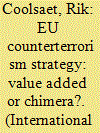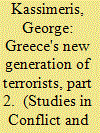| Srl | Item |
| 1 |
ID:
096753


|
|
|
|
|
| Publication |
2010.
|
| Summary/Abstract |
Europe did not wake up to terrorism on 9/11; terrorism is solidly entrenched in Europe's past. The historical characteristics of Europe's counterterrorism approach have been first, to treat terrorism as a crime to be tackled through criminal law, and second, to emphasize the need for understanding the 'root causes' of terrorism in order to be able to prevent terrorist acts. The 9/11 attacks undoubtedly brought the EU into uncharted territory, boosting existing cooperation and furthering political integration-in particular in the field of justice and home affairs, where most of Europe's counterterrorism endeavours are situated-to a degree few would have imagined some years earlier. This development towards European counterterrorism arrangements was undoubtedly event-driven and periods of inertia and confusion alternated with moments of significant organizational breakthroughs. The 2005 London attacks contributed to a major shift of emphasis in European counterterrorism thinking. Instead of an external threat, terrorism now became a home-grown phenomenon. The London bombings firmly anchored deradicalization at the heart of EU counterterrorism endeavours.
|
|
|
|
|
|
|
|
|
|
|
|
|
|
|
|
| 2 |
ID:
115011


|
|
|
|
|
| Publication |
2012.
|
| Summary/Abstract |
On 2 November 2010, the Greek government took the unprecedented step of suspending international airmail for 48 hours after a wave of parcel bombs targeting the German Chancellor, Angela Merkel, the Italian premier Silvio Berlusconi, and the French President Nicholas Sarkozy as well as a number of foreign embassies in Greece and across Europe caused a major security scare. Responsibility for the parcel bombs campaign, which placed European counterterrorism authorities on high alert, was claimed by the Greek anarchist-oriented guerrilla group, Conspiracy of Cells of Fire (CCF). Since its emergence in 2008, CCF has become one of the most active of Greece's new generation of urban guerrilla groups. This article examines CCF's campaign of violence and explains its selection of targets and the nature of its organizational and operational development.
|
|
|
|
|
|
|
|
|
|
|
|
|
|
|
|